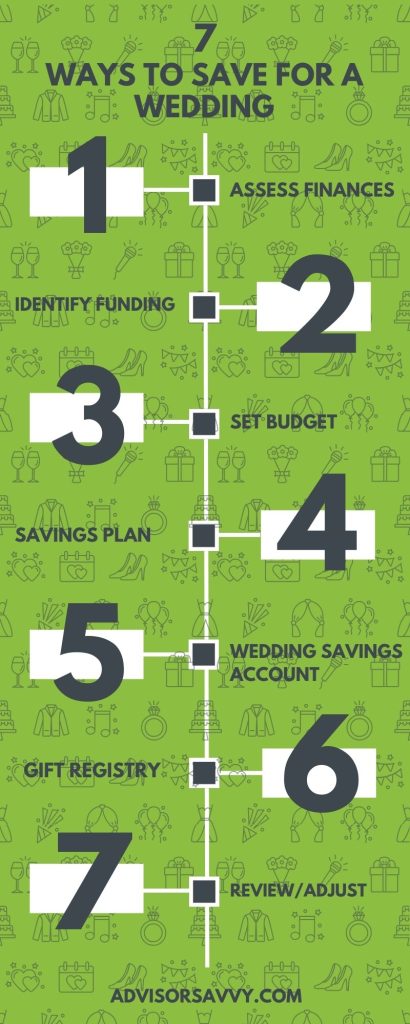
Marriage is a time for celebration. You share your love, commitment, and promising future with friends and family. For most people, a wedding is often the most expensive party they will throw. It is also one of the biggest transactions most incur in their lifetime, if they choose a traditional big wedding. There’s no denying that planning a wedding can be a joyous yet expensive event. From venues, outfits, food, and photographers, there is a lot to plan and pay for. With growing wish lists and dreams for the big day, costs quickly add up. Many engaged couples need to know how to make their wedding both magical and budget-friendly. The question of how to save for a wedding comes up a lot, especially in times of high inflation and interest.

Table of contents
- How do you financially prepare for a wedding?
- How much to save for a wedding ring?
- How much money to save for a wedding?
- What’s a good budget for a wedding?
- What is the most expensive part of a wedding?
- How long does it take to save money for a wedding?
- How to Save for a Wedding
- Alternatives to Traditional Weddings to Save Money
- Financially Preparing for the Big Day
Learn how to save for a wedding with this article. It is a necessary step as you plan for one of the biggest days of your life. Saving and budgeting often take a back seat to the more exciting details of a wedding. Inevitably, you see venues far outside your price range and emotions kick in. By setting a realistic budget and using savvy savings strategies, you can plan a magical day without breaking the bank. And if you need someone to help out with the financial aspect of your big day? Consider speaking with a financial advisor who can handle the numbers on the back end. But for now, keep reading to learn some DIY wedding savings tips!
Your credit score & report. Always free, forever
It takes 3 minutes to join 20+ million people who trust ClearScore to help them improve their financial future
Related Reading: Financial Conversations To Have Before Marriage
How do you financially prepare for a wedding?
Financially preparing for a wedding involves careful planning and budgeting. These allow you to make informed decisions. You can then celebrate your special day without financial stress. Implement basic strategies and maintain open communication with your partner. This will allow you to avoid a lot of stress, both financial and otherwise. Thereby allowing you to create a memorable wedding without compromising your financial health. The most important aspect of the day is the commitment you’re making to each other. Prioritize how you want this commitment to be celebrated and maintained for life. Financial planning can help set the stage for a secure and happy future together.
Related Reading: The Link Between Finances and Mental Health in Canada
Here are some things to help you and your partner prepare financially for your wedding:
Set a Realistic Budget, Prioritize and Compromise
- Determine the total amount you’re willing to spend on your wedding.
- Break down the budget into categories. These might include: venue, catering, attire, photography, and decorations.
- Be realistic about what you can afford.
- Prioritize your spending based on what matters most to your relationship, not materialistic ambitions!
- Be prepared to compromise on less important details.
- Consider weekday or off-season wedding dates.
- Include a contingency fund for unexpected expenses or last-minute changes.

Open a Wedding Savings Account
- Open a separate bank account specifically for wedding expenses. This allows you to track wedding expenses more easily.
- Avoids mix-up with any everyday costs.
- Avoids using funds meant for your wedding.
- Both partners can contribute to this account with every pay cheque.
Create a Wedding Savings Plan
- Calculate how much money you need to save each month leading up to the wedding.
- Adjust your lifestyle and spending habits to accommodate your savings plan.
- Identify non-essential expenses that you can temporarily cut back on.
- Consider cutting unnecessary subscriptions, dining out less, and other saving techniques during this period of your life.
Related Reading: Common Law vs Marriage Canada: What are the financial implications?
How much to save for a wedding ring?
Wedding bands tend to be less expensive than engagement rings (this is the one with the big rock!) However, both types of rings can carry a hefty price tag. How much couples should save for their wedding bands depends on their overall budget, lifestyle and income. But regardless, an expensive ring may not be how a couple wants to spend their money. Some couples may prefer to spend more money on a venue or honeymoon and compromise on a more affordable ring.
There is a perceived general rule that an engagement ring should be no more than 3 months of income. This would be the absolute highest someone should spend on a wedding ring. Of course, this is at the purchasing partner’s discretion. Further, jewelry companies invented the 3 month salary rule to drive up sales. Many couples may find this to be a large expense and prefer to get a simple band. Whereas others may be okay with the expense and opt for a fancy diamond. Ultimately, everyone’s relationship is unique and that plays into the budget of a wedding ring.
On average in Canada, $3,500 is spent on engagement rings. However, this number ranges widely. Income, taste, and quality of the ring play huge factors. Here is an Engagement Ring Calculator tool to help you determine the best budget for an engagement ring.
Related Reading: Financial Planning Tips for Students and Young Professionals
How much money to save for a wedding?
The average cost of a wedding in Canada is $30,000. This is an average which ranges widely. Some spend $10,000 whereas others spend $100,000. Your specific savings goals should be designed to be realistic around your circumstances and desires. Determining how much money to save for a wedding is a highly individual decision. It depends on various factors such as location, guest count, personal preferences, and financial capabilities. Here are the main factors that should be considered:
Your Finances
- Look at your current financial situation, including savings, income, expenses, and debt.
- Consider your overall financial goals, including desires and priorities. There may be tradeoffs to consider here too. For instance, if you spend more money on a wedding, that might impact your ability to buy a house once you’re married.
Shared Expectations
- Each partner should clearly share expectations for the wedding before you start the process.
- Determine what elements of the wedding are most important to both of you.
Research Average Costs and Expenses
- Research average wedding costs in your area and for the type of wedding you envision.
- Consider costs associated with: venue, catering, attire, photography, decorations, and entertainment.
- Additional costs can include: marriage license fees, transportation, accommodations for guests, and any unexpected expenses.
- These estimates will feed into your wedding budget so keep them on hand.
Determine Funding Sources
- Identify potential sources of funding, which can include: personal savings, credit cards, personal loans, and contributions from friends and family.
Any Potential Cost-Saving Measures
- Look for ways to cut costs once you have a fleshed out budget.
- DIY projects, negotiating with vendors, or choosing a more budget-friendly venue are common cost saving measures.
Related Reading: What is Life Insurance?
What’s a good budget for a wedding?
As mentioned above, the average cost of a wedding in Canada is $30,000. This may be a good starting point for a “good” or “ideal” budget. This does not mean it will be your final budget. It is just a good place to start. From there, you can start considering your personal financial situation and ask questions, such as: Does that number seem too low or too high for you? Does it seem like something you can save up to do within a year or less? Do you have any family support to consider?
Determining a “good” budget for a wedding depends on your circumstances. We have discussed a few variables. However, let’s look at how a typical budget is organized by the percentage of the total budget by category (Source: Brides Magazine):
- Venue and Catering: 40%, or $12,000 of a $30,000 budget.
- Photography and Videography: 15%, or $4,500 of a $30,000 budget.
- Wedding Attire and Beauty: 5%, or $1,500 of a $30,000 budget.
- Music/Entertainment: 10%, or $3,000 of a $30,000 budget.
- Flowers: 10%, or $3,000 of a $30,000 budget.
- Favors and Gifts: 2%, or $600 of a $30,000 budget.
- Transportation: 3%, or $900 of a $30,000 budget.
- Stationery: 3%, or $900 of a $30,000 budget.
- Cake: 2%, or $600 of a $30,000 budget.
- Décor: 10%, or $3,000 of a $30,000 budget.
These are common expenses associated with weddings, with their commonly allocated percentage of the overall budget. Some additional categories may include miscellaneous expenses and a contingency fund. No category is mandatory and depends on your desires for the big day. You can also play with the percentage you spend on each category. Looking at averages, and average categories may help you design a plan suited for you.
What is the most expensive part of a wedding?
The most expensive part of a wedding often varies. However, the bulk of most wedding budgets goes towards a venue and food/alcohol/catering. The location, type of food, number of guests and add-ons can significantly affect this cost. Other high-ticket items are typically vendors. These include wedding planning services, photography, bands, and other people hired to provide a service.
Personal priorities and preferences play a significant role in which elements are most expensive. For most, the venue may be the single largest expense. However, others invest in high-quality photography. Some brides also prefer to go all out on their wedding gowns.
How long does it take to save money for a wedding?
The amount of time it takes to save money for a wedding can vary widely depending on your savings goal, income and expenses. Most couples plan their wedding within about a year. However, timelines can shift depending on how aggressively they save and their total budget. A higher-budget wedding will take longer to save for. If a couple can save aggressively, they may hit their goals quicker. Additionally, if a couple has support from parents or pre-existing savings, they may be farther along.
Budgets and timelines are unique to a couple’s circumstances. Couples should regularly review their progress and adjust their savings plan if needed. Open communication with your partner and a clear understanding of financial goals will contribute to a smoother and more successful saving process.
How to Save for a Wedding
Here’s a step-by-step guide to help you save effectively for your special day:
1. Assess Your Current Finances
- Evaluate your current financial situation, including income, expenses, existing savings, and debt.
- Consider where you can cut back on your day-to-day spending.
2. Identify Funding Sources
- Determine where the money for your wedding will come from.
- This may include personal savings and/or contributions from family.
3. Set a Realistic Budget
- Determine the total amount you’re willing to spend on your wedding.
- Break down the budget into categories by priority.
- Prioritize and compromise on what you need versus what you want.
4. Create a Savings Plan
- Calculate how much money you need to save each month leading up to the wedding.
- Consider the time remaining until your desired wedding date.
- Consider extra work, side hustles, or additional income streams to help save.
5. Open a Wedding Savings Account
- Open a separate bank account specifically for wedding expenses.
- Negotiate, shop smart, and shop around.
- Negotiate with wedding vendors to get the best deals.
- Shop around for competitive prices on venues, catering, and other services.
- Consider alternative dates and times, off-peak days offer better pricing.
- Consider DIY projects to reduce costs. This can include handmade invitations or floral arrangements.
6. Utilize Gift Registries and Cash Funds
- Create a wedding registry to receive gifts that can contribute to your wedding expenses.
- Some registries even offer cash funds for specific purposes.
7. Review and Adjust
- Regularly review your budget and savings plan.
- Adjust your goals based on changes in your financial situation or wedding plans.
- Prepare an emergency fund for unexpected costs.
- Communicate with your partner openly and honestly. Make sure you check in regularly.
Related Reading: Financial & Legal Benefits of Marriage in Canada
Alternatives to Traditional Weddings to Save Money
If a big, traditional wedding is not your thing and you’re strapped for cash, there are alternatives to consider. Marriage in the modern day looks very different, and many weddings reflect that. In fact, a couple recently went viral because they had their wedding on a Toronto street car! Who says you need to do it the old fashioned way?
Here are some alternatives to traditional weddings that can help you cut costs:
Micro Weddings or Elopements
Consider having an intimate ceremony with just close family and friends. You can even consider eloping to a destination of your choice, or maybe just your local courthouse. This often reduces costs associated with a large guest list and traditional venue.
Backyard Wedding
Host your wedding in a backyard or a meaningful outdoor location. This can save on venue costs and offer a more relaxed and personal atmosphere.
Casual Dress Code
Encourage guests to dress casually instead of formal wedding attire. This can reduce the need for expensive dresses and suits. Plus, everyone can express their personal style!
Potluck or Food Truck Catering
Instead of hiring a traditional catering service, consider alternatives. A potluck-style reception where guests bring a dish to share, for example. Alternatively, food trucks can offer a more budget-friendly catering option.
Digital Invitations
Save on printing and postage costs by sending digital invitations. This can be done through email or using online invitation platforms. It also offers a great way to organize RSVPs and food allergens.
Minimalist Decor
Having a minimalist approach to decor focuses on essential elements. This not only reduces costs but can create a clean and sophisticated aesthetic.
Non-Traditional Wedding Cake
Choose a non-traditional dessert option. This can include cupcakes, donuts, or a dessert bar. All these options can be more budget-friendly than a custom tiered wedding cake. Alternatively, you can have a fake-tiered wedding cake. This allows you to “cut” the cake, then have slab cake discreetly served from the back.
Financially Preparing for the Big Day
A wedding should be a fun celebration of your love with your partner. Your budget should be designed to help you sustain and grow that love beyond your wedding day. Do not break the bank to have an extravagant party beyond your means. Create a plan that incorporates all your musts. Become clear on your priorities and honour a budget and savings plan. This will allow you to have the best wedding day possible. With so many costs and variables, you can plan well and save big. How to save for a wedding includes open communication and allowing yourself the time to do it. Never take on more than you can handle and get creative with your resources.
If you ever need help with the financial preparation aspect, consider consulting with a financial advisor. They can help you build budgets, create a savings plan and negotiate prices with vendors. Complete this quick questionnaire to be matched with one today!
Read More: Tips on How to Save Money

